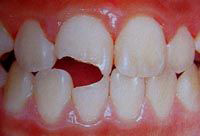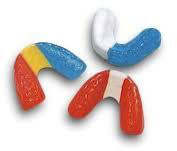When Dental Injuries occur it can be quite an upsetting event. The important thing is not to panic.
As most dental injuries occur from the ages of 2 to 18 it is important that parents, teachers and coaches know how to manage them appropriately. Below is a guide to help you do this.
The primary (Baby) teeth are very closely related to the permanent teeth, which are forming inside the bone.
Injuries to primary teeth can damage the forming permanent teeth. This damage can affect the aesthetics of the permanent teeth resulting in whitish spots or deformation of the crown when they erupt. The more serious the injury the more damage can occur ie intrusion into the gum.
If a baby tooth is knocked out it is important NOT to replace it in the socket. This can also cause damage to the permanent tooth.

First you must consult your dentist immediately after the accident occurs. This has many advantages:
1. There is more chance of conserving the tooths vitality;
2. There is a better long-term prognosis;
3. Future complications and high cost treatments can be avoided.
The important thing is not to panic.

Only Permanent teeth can be replanted. Baby teeth should not be replanted.
For further advice click here.
 While we do cater for emergency appointments, we believe that prevention is better than cure. While not all dental injuries may be prevented, regular use of a mouthguard (gumshield) during sports such as Hurling, Gaelic Football, Soccer, Rugby, Basketball, Boxing and other high-risk activities is the most effective prevention.
While we do cater for emergency appointments, we believe that prevention is better than cure. While not all dental injuries may be prevented, regular use of a mouthguard (gumshield) during sports such as Hurling, Gaelic Football, Soccer, Rugby, Basketball, Boxing and other high-risk activities is the most effective prevention.
Even in sports such as hurling, where it is mandatory to wear a helmet and face guard, a mouthguard can help prevent dental injuries. It can do this by acting as a cushion to prevent tooth on tooth contact.
A rubber-like cover which should fit exactly over your upper teeth and gums, cushioning them and protecting them from damage.
There are a number of different types of sports mouthguards available, however, the only type we recommend is the custom made mouthguard. These are individually designed by your dentist taking moulds of your mouth. They provide the most comfortable fit and best protection and need to be replac ed less often due to wear.
Payment Options at
Belvedere Dental Care:
